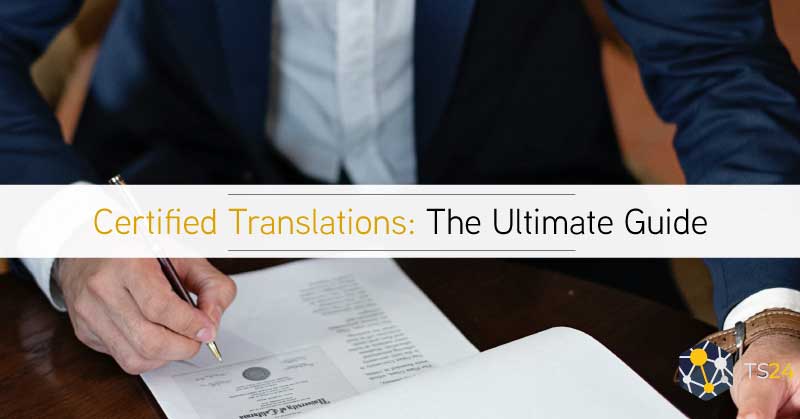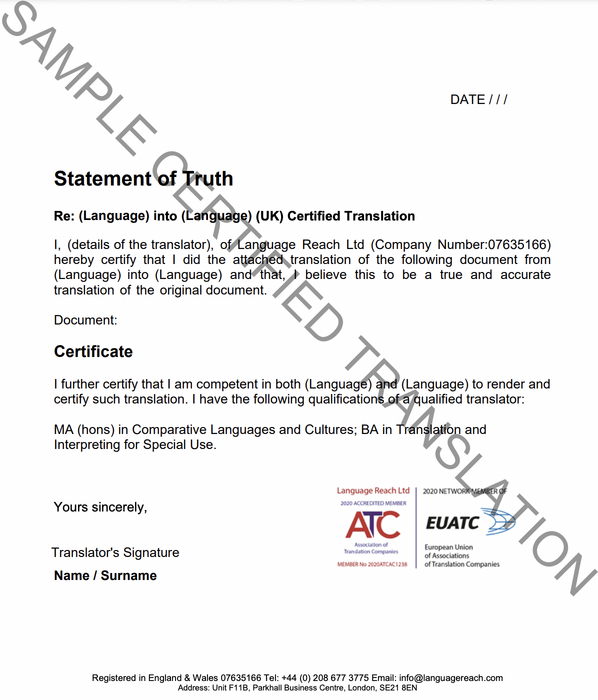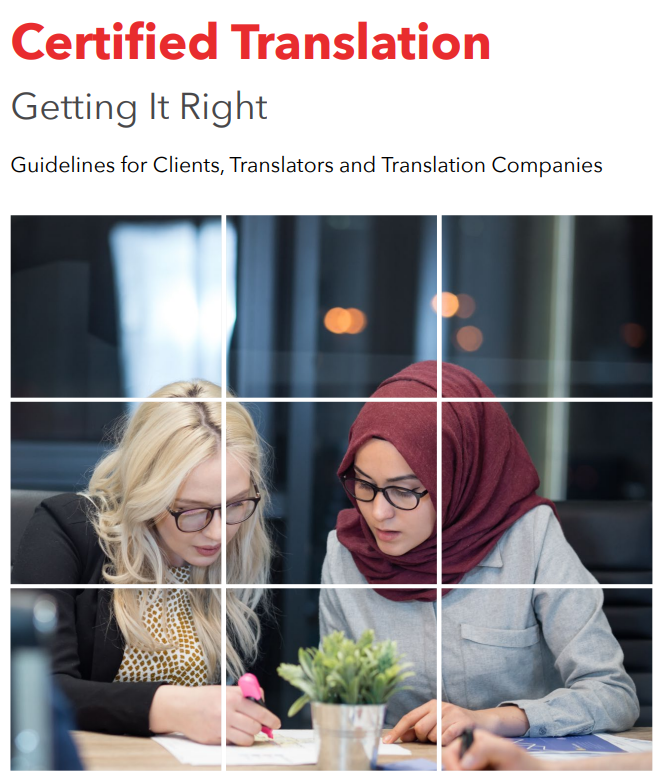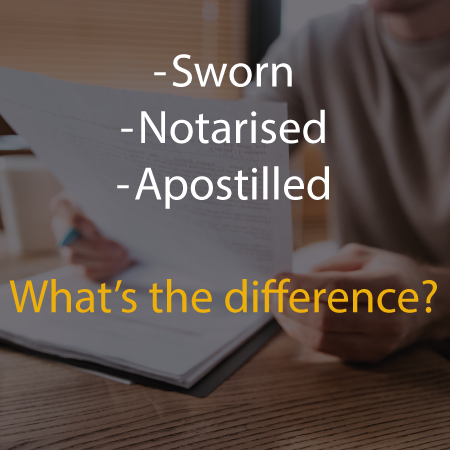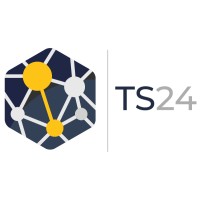The Complete & Ultimate Guide to Certified Translations
You might have heard the terms “certified translation” or “official translation” in various contexts, for example, when applying for immigration, handling visa applications, going through legal proceedings, or dealing with other official documents.
It is crucial to understand the different types of certified document translations, what they mean, when and why you might need them, and the importance of obtaining official certified translation services from professional translators.
Professional translations can be somewhat confusing, especially if you have never needed to get your documents officially converted into another language before. To help you navigate these intricacies of certified translations, TS24’s expert translators prepared this in-depth guide.
What Are Certified Translations? Here’s a Simple Explanation
A certified translation is not just a translation, it’s an official document that meets the legal requirements of a specific country. It’s a crucial tool for essential matters like applying for passports and visas or legal matters such as marriage and divorce. This type of translation is recognised as accurate and reliable for formal procedures, making it an essential part of any legal process.
It’s usually required for official documents like:
• Birth certificates
• Marriage and divorce certificates
• Immigration services
• Passport and visa application
• Court documents
• University degrees, etc.
These certified translations are not just accurate; they are as good as the original document and are accepted in the UK and in other jurisdictions. They also accompany a certified letter citing that the translation is true to the original and carry the translation company’s signature and stamp, providing a seal of approval.
The certified letter should be in the language of the person or authority who will receive it. For example, if you are submitting your translation to UK courts or government authorities, the certified letter should be in English only, not in both the original language and English. This ensures it is clear and understood by those who need it.
In the UK, most government offices, such as the passport office, the Home Office, the Border Agency, and other universities and embassies, require a certified translation.
Certified Translation Statement – Example
How to Certify Your Translation?
To certify your translations, a translation company provides a certificate with the translated documents. This certificate acts as proof that the translation is accurate and complete. To make your documents legally accredited, it must state that the translation is a true and accurate translation of the original document, including the date of the translation, and provide the name and contact details of the translator or a representative of the translation company, along with their signature and stamp on headed paper.
Find a Registered Translation Company
The government requires you to use a registered translation service provider that can ensure they provide the below in the certified translation.
• True and precise translation of the original document.
• The time and date the translation took place.
• Contact details of the translation company.
Currently, TS24 Translation Agency is one of the UK’s leading providers of professional translation services.
Ask for a Price Quote
After you have found the right company for your certified translation, ask for a quote and the expected turnaround time. Typically, a one-page document like a marriage, birth, or death certificate takes about two working days to translate, but this can vary based on the number of words, the type of document, and the language pair.
To get all the details about your translation project, speak with an Account Manager. They can provide information on costs, timelines, and any other specifics you need. Many agencies also offer urgent services for an extra fee if you need your translation done quickly.
During the Quoting Process
When asking for a quote, make sure to send in your documents. Without them, you will only receive an estimated quote instead of a final one. Be sure to specify the source and target languages, where the translation will be used, and any relevant background information.
While the Account Manager is knowledgeable, it’s your responsibility to share the requirements set by the authority that will be using the translation. Your input is crucial in ensuring accuracy and meeting all necessary standards, making you an integral part of the translation process.
Receiving Your Translated Document
Once your translation project is completed, you will receive the translated copy according to the agreed timeline. Typically, it is sent to you by email, followed by a hard copy in the post. The e-copy lets you review the translation for accuracy and keep it on file.
After you receive the e-copy, you can request a hard copy if needed. While a soft copy usually meets most requirements, certain situations, like court proceedings, may require a physical document.
Certified Translation ATC Guidelines (PDF)
EXPERT’S TIP: Are you looking for the best translation agency for your business? Here’s what you should look out for!
What is Included in an Official Translation?
A certified translation comes with an accredited letter printed on a translation company’s head paper. This letter includes:
• Confirmation of the translation’s accuracy.
• The date and time of the translation.
• Contact details of the translation company.
• A stamp and signature.
Sometimes, additional details, like a Statement of Truth, may be needed along with the certified letter for matters like divorce proceedings. This statement typically includes:
• The name of the document.
• The translator’s qualifications.
• A confirmation of the translation’s completion and accuracy.
• The date of issue.
• The translator’s name and signature.
• A reference to the translated document and the language it was translated into.
What is the Difference Between a Sworn, Notarised, and Apostille Translation?
In translation services, you often encounter three types of certified translations: sworn, notarised, and apostille. Let’s break down what each one means and how it differs.
Sworn Translation
A sworn translation is done by a translator authorised by the government or a court. This type of translation comes with a signed and stamped statement from the translator confirming the translation is accurate and complete. This makes the translated document legally valid, just like the original.
Sworn translations are needed for matters like immigration and legal documents. However, in the UK, sworn translations are not recognised, so you won’t need one here. But if you’re applying for immigration to a country that requires it, you might need to get one.
Notarised Translation
A notarised translation involves a Notary Public who certifies that the translation is accurate. The translator swears in writing about the translation’s accuracy, and the Notary Public adds an official seal. This type of translation is used for legal documents like contracts, deeds, and powers of attorney, making them legally binding.
Process of a Notarised Translation
After your translation is finalised, a Project Manager will send you an e-copy of your certified translation. This is your chance to review it and make sure everything is accurate and to your satisfaction. Once you approve it, the notarisation process will begin.
The notarisation takes about 5-7 working days from your approval and comes with an additional cost. After the notarised translation is complete, it will be sent to you by post.
Apostille Translation
An apostille translation involves getting a certification from an Embassy or government office, making your document legally valid in another country. In the UK, the Foreign Commonwealth and Development Office (FCDO) issues these certificates, which certify the authenticity of the document and signature. This type of translation is often required for important documents like birth, death, and marriage certificates. The FCDO can only certify documents that originate from the UK.
Process of an Apostille Translation
To start, ensure the document you want to translate is an original. Once your translation is ready, you will receive an e-copy to review and approve. After you give the green light, the document will be notarised. The notarised document is then sent to the FCDO for the apostille certification.
After the translation is complete, the entire process takes about 4-5 weeks. Once finalised, the hard copy will be sent to you by post. Knowing the differences between these types of translations can help ensure that your documents meet the requirements for their intended use.
When Might You Need a Certified Translation?
Here are a few situations where you might need to submit certified translations.
Legal Documents
You must get certified translations for almost all legal documents, especially for UK courts, for documentation used during hearings, such as transcripts or evidence in other languages, court orders, etc. Any document you submit to the government or legal bodies must also have a certified translation.
For Immigration
When applying for immigration to the UK, you might need to provide certified translations of essential documents. These documents could include birth certificates, marriage certificates, academic records, and legal documents.
For University or Educational Institutes
When applying to a university, you might need certified translations of your academic qualifications, including all your transcripts and diplomas. Sometimes, you may also need to submit the original documents alongside the certified translations. Keep in mind that different countries and universities have specific requirements, so it’s essential to check what each institution needs.
Company Requirements
Certified translations are often essential for various company documents, including contracts, policies, employee handbooks, and manuals. Ensuring these documents are accurately translated is crucial for clear communication and legal compliance.
In addition to these documents, companies might need certified translations for financial reports, marketing materials, and official correspondence with international clients and partners.
Medical Procedures
If you have medical records, prescriptions, or treatment histories from another country, you might need these documents translated. Certified medical translations are also helpful in legal situations. Whether for medical malpractice cases, insurance claims, or legal disputes involving health issues, having clear and accurate translations of medical documents helps resolve matters fairly and efficiently.
Who Can Officially Certify a Translation?
Certifying a translation isn’t something anyone can do; some specific requirements and considerations must be met.
ATC, CIOL and ITI endorse each other’s members for these certifications. They recognise members providing certified translation services as qualified professional translation companies or individuals who are also members of the recognised translation associations from the Chartered Institute of Linguistics (CIOL) or the Institute of Translation and Interpreting (ITI).
They may also be CIOL professional members, such as members (MCIL Translator), Fellows (FCIL Translator), Chartered Linguistics (Translator), or qualified ITI members.
Some companies like ours are accredited members of the Association of Translation Companies (ATC) or corporate members of ITI.
How Do I find the Right Translation Company to Certify My Documents?
Always look for a reputable translation company for your certified translations. They should have industry experience and be skilled to meet all your requirements.
Some other things to look into are:
• Knowledge: Go for a translation company that deeply understands your field or line of business, such as legal, technical, medicine, finance, etc.
• Quick Service: The company should have reasonable turnaround times so there are no delays.
• Confidentiality: The company must ensure the confidentiality of the documents you share with them.
• Customer Support: You need a company that will listen to and answer your concerns. Companies open to communication should have solid communication via their Account and Project Managers.
• Translators’ qualifications: Look into the translator’s qualifications and certifications.
• Native Speakers: Native speakers grasp the depth of language and are mindful of its cultural nuances, local sayings, and other sensitivities. Native linguists must be assigned to all projects.
Does My Certified Translation Need to be Printed, or Is a Digital Copy Sufficient?
In today’s digital era, almost everything is moving online, including documents and certifications. Digital copies are widely accepted in many cases, even in legal procedures. Digital documents also reduce turnaround time and are environmentally friendly.
However, acceptance of digital copies can vary between institutions and authorities. For example, some courts may require physical copies with original signatures.
Can I Use Google Translate for Official Translations?
Google Translate is good for quick and minor translations, like learning to say “hello” in another language. However, it’s not suitable for certified translations. Certified translations must be accurate and follow a specific format, which Google Translate cannot provide.
Using Google Translate for important documents can lead to mistakes that might have serious consequences, especially since these documents often carry legal weight. Additionally, certified translations require a professional touch to ensure accuracy and adherence to legal standards.
Most importantly, translation companies cannot usually certify a document not completed in-house by a certified translator. Always use a professional translation service for certified translations to ensure your documents are accurate and legally valid.
How Long Will My Certified Translation Take to be Completed?
The turnaround time for your certified translation can vary based on the word count, language pair, and document specifics. For more details and to get a quote, feel free to contact one of our Account Managers today. They’re here to help with any questions you may have.
How Much Do Official Translations Cost?
The price for officially translating and certifying your documents in the United Kingdom usually varies between £30 – £50 (+VAT) per page for a standard certification type. The cost is usually higher for other types of certifications, such as notarization or apostille. You can find the complete pricelist for professional translations here.
The Importance of Working with a Certified Translation Company
Working with a certified translation company means you can be confident that your certified translations will be accurate and accepted. Choosing a translation service recognised by organisations like the Association of Translation Companies (ATC), the Institute of Translation and Interpreting (ITI), or the Chartered Institute of Linguists (CIOL) helps you avoid costly mistakes.
How Do I Get an Official Translation?
To get a certified translation, simply email info@translationservices24.com or call the TS24 Certified Translation Office on +44 208 677 3775. You can also order your official translations online within 30 minutes.
Quick Summary
Certified translations are vital for ensuring your documents are accurate and legally recognised, whether for immigration, legal matters, medical records, or business needs. By choosing a certified translation company, you guarantee that your documents are handled by skilled professionals who meet the highest standards of quality and reliability.
About TS24
Translation Services 24 (TS24) is an expert translation agency in London with expert translators in over 200 languages. We work with clients in all corporate and public industries and specialise in sector-specific linguistic solutions. With over a decade of experience in the industry, 15+ million words converted every year and 100,000+ projects completed, TS24 is a leading provider of expert translations and interpretation services and an officially certified member of the ATC. Contact TS24 here. You can also read all of our recent articles here.
Follow Translation Services 24 on Social Media

